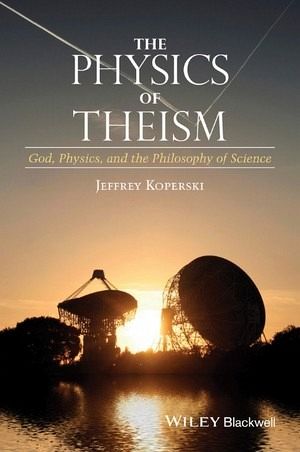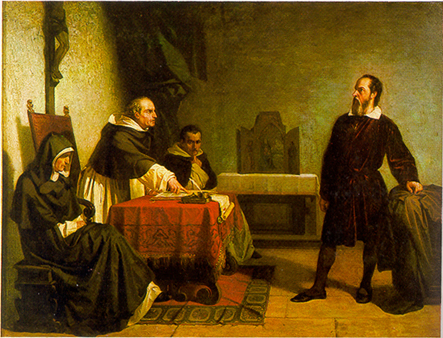Podcast: Play in new window | Download
Subscribe: Spotify | Email | RSS
 Is “Science” at war with “Religion”? Philosopher of science Dr. Jeffrey Koperski says that this is myth and not reality. In this episode we discuss five popular myths about science and religion, myths which stand in the way of people see both for what they have been and now are.
Is “Science” at war with “Religion”? Philosopher of science Dr. Jeffrey Koperski says that this is myth and not reality. In this episode we discuss five popular myths about science and religion, myths which stand in the way of people see both for what they have been and now are.
- The Big Bang has taken the place of God – it shows us where the cosmos came from.
- As long as there’s been Science, there’s been a war between Science and Religion.
- Galileo was clearly a martyr in the Science and Religion wars.
- Religion is based on Faith, whereas Science is based solely on empirical observation.
- Science is supremely open-minded, willing to drop all traditional assumptions upon the receipt of new data.
Along the way Dr. Koperski mentions additional, lesser myths, such as that Columbus discovered that the earth was not flat.
[spp-tweet tweet=”There’s more to religion than faith… more to science than observation… – Dr. Jeffrey Koperski”]
Links for this episode:
- Dr. Jeffrey Koperski’s home page
- The Physics of Theism: God, Physics, and the Philosophy of Science (kindle)
- Dr. Lawrence M. Krauss, A Universe From Nothing: Why There Is Something Rather Than Nothing (kindle), NYT review by philosopher Dr. David Albert
- Paul Shestople, “Big Bang Cosmology Primer“
- Issac Newton, Principia Mathematica
- Anjan Chakravartty, “Scientific Realism“
- Bradley Monton and Chad Mohler on Bas van Fraassen’s “constructive empiricism”
- phlogiston, caloric
- Galileo, Dialogue Concerning the Two Chief World Systems

- Ronald Numbers, Galileo Goes to Jail and Other Myths about Science and Religion
- Historian of science John Hedley Brooke
- Alexander Bird on philosopher of science Thomas Kuhn
- Today’s thinking music has been “Malachite” by Andy G. Cohen, Released under a Creative Commons Attribution International License. https://andyg.co/hen/songs/malachite.

Excellent podcast.
One thing that could have been discussed is that science does not operate as isolated hypotheses- but as Research programmes continuing over many years. As such, it is often very difficult to falsify hypotheses in a research program due to the many auxiliary hypotheses that are connected with it. If a prediction is not confirmed, you don’t know where exactly is the problem lies- in the core or in one of the many assumptions made.
Hi,
This was an interesting podcast (since it incorporated some discussion of science and mathematics with Theism). I would just like to make a few points from a first impression of what I heard from the interview.
1. I like that thr issue of God being “eternal” and the issue of an expanding universe came up. However, we don’t have any scientific (observable) evidence of any “beginning” or “end” of the universe (at least within about 13 billion light-years of the Earth). Thus, it seems more reasonable to think that perhaps if God is without beginning or end so may be His universe.
2. The author mentioned how much of the Big Bang theory is based upon the observation of objects moving “away” from the Earth in all directions. This is determined by Red Shift. However, more recent scientific observations have found that some objects at the same distance from the Earth have significantly different Red Shift values while other objects near the “edge” of the known Universe also have high Red Shift values that defy the complexity of their structures. Thus, Red Shift can no longer be assumed to be an indicator of the “age” or “distance” of an object with respect to the Earth (and isn’t necessarily evidence that the Universe is expanding).
3. The author made a critical point about how the Big Bang “equations” essentially “break down” at the point where “the beginning” ought to be. This is indicative of why Physics and Mathematics cannot explain the origin of matter. They should only be used to describe what science can actually observe that is happening with existing matter and space (dimensions). Moreover, equations that treat “time” as if it is material or spacial should be disregarded.
4. I liked the author’s brief discussion of “realism” (and that it has some “weaknesses”) but it would have been nice if he had offered some examples of what we should believe that cannot be verified by science (empirical verification) or history (reliable testimony). It seemed like he was suggesting that we ought to believe in some things without any evidence.
5. The author’s discussion of the Galileo story was very interesting. It’s a good example of why earlier theories about a Geocentric Universe needed to be changed based upon later scientific observation (i.e. Galileo’s observation of moons revolving around Jupiter). This is what should be happening today where evidence from space exploration (and laboratory experiments) during the past 40 years have demonstrated that Einstein’s assumptions about Mass and Gravity are no longer valid.
6. I think the idea of “mathematical elegance” in Physics is slippery slope. Things like “black holes” and “dark matter” and “String theory” are not “scientific reality” because mathematicians manipulate their equations to compensate for evidence that doesn’t suit prevailing speculation.
7. I liked the author’s points about “tenacity” in that scientists shouldn’t be too hasty about abandoning theories until their is substantial reason to do so. But, I like the way he also admitted that “change” in the scientific community is slow and difficult since people are typically resistant to change and often motivated by pride. Like Dale also interjected, it wouldn’t be a good idea to simply make “ad hoc changes” every time a new piece of information comes along.
Comments are closed.